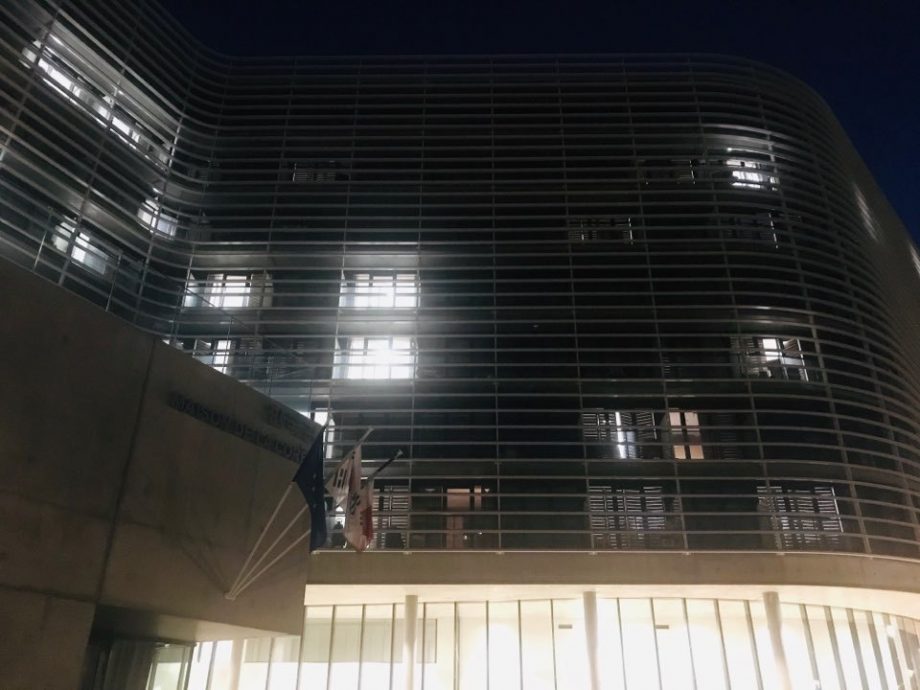At the Border of Us and Them
An Anecdote of a Korean International Student Going Through Corona Pandemic in France
With the spread of the coronavirus, social distancing has become a new imperative. The changes are indeed very fast-paced. While many countries are adopting various measures to control the coronavirus outbreak, some measures are tougher than others, from mere recommendation on reducing social and physical contacts to an enforced lockdown in the village/city or travel restrictions between nations. In one way or another people are all isolated facing those restrictions and it has become apparent that no one was truly prepared for this. While everyone is being affected by this unprecedented event, are we all isolated in the same way? This could be an interrogation which might seem absurd in this undeniably globalized world; indeed, the virus is all over the world as much as Ulrich Beck (1992: 36) asserted that smog is democratic. Yet, I’d like to argue that people are experiencing this situation differently according to their economic and social status as well as nationalities and where you live. To more precisely respond to the question above, let me share my experience as a foreign student from South Korea studying in France, stuck in my tiny room for the past two weeks, like everyone else. This is a short anecdote which allowed me to realize that my situation as an international student reveals the question of belongingness and exclusion in the context of this corona pandemic.
Confined at home, away from home
Since 2018, I have lived in the International University Campus in Paris (Cité Université Internationale Paris), which claims to be “a home away from home”[1], welcoming students from more than 140 countries. Among 40 houses, the Korea House (Maison de la Corée) is where the majority of the residents, including myself, are Korean students. Living here has been very comfortable because I really feel at home here. We share common challenges as Korean foreign students, we sympathize with each other’s experiences, and more importantly we can cook Korean food together in our shared kitchens.
On the 16th of March, President Emmanuel Macron announced a 15-day lockdown starting from the following day. He repeatedly stated, “We are at war” and that the borders would be closed against most non-EU citizens to enter EU for 30 days to prevent the spread of the coronavirus. He added that French people abroad would be able to return to France.
At that very minute, in a group chatroom, residents of the Korea house were asking each other what this meant for foreigners residing in France. Would we be able to get out? President Macron spoke in broad terms of banning entry and the blocking of all travels but did not clearly mention if foreigners residing in France were allowed to leave without any restriction. The entire speech was addressed to French people, starting with phrases such as “Dear compatriots” or “Dear French people” which is of course fair and understandable. Nonetheless, without precise direction, we non-French residents were left perplexed. While those of us who understand French[2] attempted to translate and figure out the exact instructions from the President’s speech, others who didn’t understand French very well had to wait, feeling even more lost and uneasy. Ultimately, we all had to wait until the following day to get clear answers from the Korean Embassy in France. (And yes, we were allowed to go back to Korea, albeit on very limited plane schedules)
Since then, the detailed rules of the lockdown have continued to change: the format of required documentation in which the reason for leaving home were stated; the penalties which increased rapidly; the time limit for physical exercise; the allowed distancing limit from one’s place of residence, and much more. Every time these changes occurred, we students felt one step left behind in terms of accessing the information and again due to the language barrier.
Right after the lockdown, the French Ministry of National Education, High Education and Research recommended that all the international students should return to their countries. Soon after, the residents of the Korea house received mail from the director of the house with the same recommendation. Anxious about the situation in France, in the subsequent two weeks, almost half of the residents have left France to go back to Korea. The other half, including myself, stayed, because fortunately the house would not force us to leave.

The Korean house half-empty. Copyright: Juhyun Lee (2020)
The students who left chose to do so not only because of the director’s recommendation or because they feared the coronavirus, but also because they felt helpless with regard to the constantly changing rules. One of my Korean friends who is also doing a PhD, registered in a national university in France, confided in me that while she received e-mails from her University requesting that the French students studying abroad return to France, not once did she receive an e-mail concerning international students and what they should do. “I don’t feel like I belong to my university, and I don’t feel like I’m being taken care of at all”, she said.
Korean students who remained in France have increasingly relied on the Korean Embassy for the detailed, up-to-date information. In this time of emergency, it has become clear to us: we are only foreigners here. We reaffirm our identity as Koreans, and we count on our Korean government for our safety. Indeed, the Korean government has decided to send two charter flights to Italy, where the situation is dire, to retrieve nearly 600 South Koreans citizens.
Meanwhile, more than 24,000 Koreans in Korea signed a petition to the government to stop repatriation of these Koreans from Italy. A close look at the contents of the petition shows the statement:
“we can accept the returning of the Korean students, but not those who became Italians, paying taxes in Italy. They want to benefit from the healthcare system of South Korea. Shouldn’t the government distinguish who to give help with our taxes, rather than wasting the money unnecessarily? Please spend the money on the recovery of “our” citizen (…) prioritize “our” people.” (emphasis in italic put by the author)

Expat Koreans getting out of charter flight from China. Copyright: Kookmin Ilbo (2020). Usage authorized by the author.
This hostile sentiment towards expat Koreans was reinforced after several cases of infections coming from abroad were reported. Korean students studying abroad recently have been a new threat, such that a neologism ‘students studying abroad-phobia’ has been coined. The situation became worse after a Korea student in the United States did not respect the self-isolation regulation and traveled despite having coronavirus symptoms. Moreover, since 13 cases were found in the district known to be the richest neighborhood of Seoul, the hostility is now towards those who are ‘rich enough to study abroad and selfish enough to bring back the virus.’ (ibid.)
Under these circumstances, we experience another form of social distancing: if we are in France, we are perceived as foreigners who are excluded from being addressed as ‘dear compatriots.’ But in the eyes of some Koreans, we are also ‘them’ excluded from being counted among ‘our people’ and seen as a threat to Koreans living in Korea. On top of this, due to the administrative chaos caused by the coronavirus, overseas Koreans are not permitted to vote in the upcoming general election. More than ever, we feel like second-class citizen.
Conclusion: Doubly-Isolated in the era of pandemic
Some say that the coronavirus has neither borders nor nationalities. Nevertheless, the subsequent antagonism makes these borders. We are clearly witnessing the rapid rise of hatred-fueled nationalism by drawing lines and dividing people. We draw lines between countries by closing frontiers and blocking flights, we draw lines between races, and the list continues to develop.

Corona meme on social media.Copyright: Petter Pentilä. Usage authorized by the author(s)
There are obviously multiple ways in which our belonging and non-belonging is defined as a group of Korean international students in the context of COVID-19, to the eyes of French citizens as well as those of Koreans. In other words, the expectation to be a global citizen regardless of my nationality or my racial background and to be protected as a Korean citizen are both challenged. What we are experiencing clearly shows the mechanisms of exclusion such as the ingroup-outgroup division especially during this time of crises.
When xenophobia and anti-Chinese racism related to the virus spread, was I relieved because I’m not Chinese? When there was the petition requesting the entry ban for overseas Koreans who weren’t students, was I relieved that I’m a student and not paying taxes in France? No, because anti-Chinese racism soon became anti-Asians racism, and the hostility towards non-student expat Koreans returning home soon targeted all Koreans returning home. With this logic of exclusion on the level of nation, race, and even that of class, I find myself on this constantly changing border between ‘us’ versus ‘them’, somehow double-isolated.
Written on 03. April 2020
Juhyun Lee is a PhD student at CERMES3(Centre de Recherche, Médecine, Sciences, Santé, Santé mentale, Société) which is a multidisciplinary research center in the domain of the sciences, medicine and health. She is currently working on the question of cyberaddiction and its impact on sociability.
Email: juhyun.lee@parisdescartes.fr
Linkedin: https://www.linkedin.com/in/juhyun-lee-a0906a132/
#WitnessingCorona
This article was simultaneously published on the Blog Medical Anthropology. Witnessing Corona is a joint blog series by the Blog Medical Anthropology / Medizinethnologie, Curare: Journal of Medical Anthropology, the Global South Studies Center Cologne, and boasblogs.
Footnotes
[2] There are many students taking all courses in English.
Bibliography
DY, Kim. 2020. In Gangnam district, the largest in number of students coming from abroad and that of coronavirus infection rate. News1. https://www.news1.kr/articles/?3895803. Last access: 3 Avril 2020.
HS, Cho. 2020. Kookmin Ilbo. Charter flignt from Wuhan. http://m.kmib.co.kr/view.asp?arcid=0014187705. Last access: 3 Avril 2020.
Ministère de l’Enseignement supérieur, de la Recherche et de l’Innovation. 2020. COVID-19 : L’enseignement supérieur mobilisé. https://www.enseignementsup-recherche.gouv.fr/cid150458/www.enseignementsup-recherche.gouv.fr/cid150458/epidemie-de-covid-19-mesures-prises-a-destination-des-etudiants.html. Last access: 29 March 2020.
Petition to the Office of the President of South Korea. 2020. Block the entry of Expat Koreans in Italy. https://www1.president.go.kr/petitions/586897. Last access: 28 March 2020.
SH, Ahn. 2020. 6 cases of students coming from abroad reported in Gangnam district. Financial News. https://www.fnnews.com/news/202003281951536533. Last access: 29 March 2020.
Ulrich, Beck. 1992. Risk Society: Towards a New Modernity. New Delhi: Sage. (Translated from the German Risikogesellschaft) 1986.

































